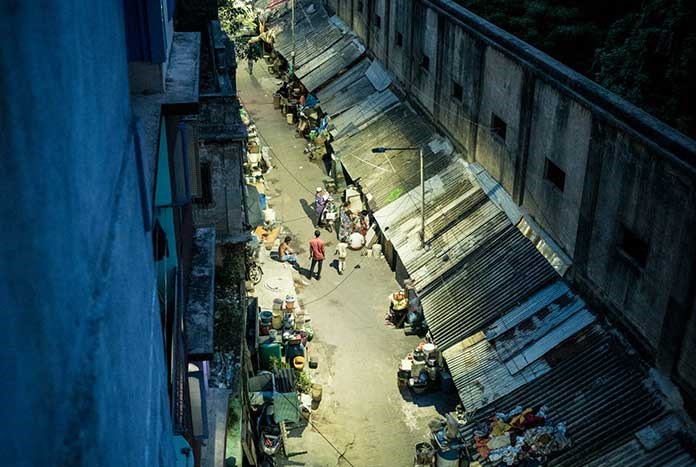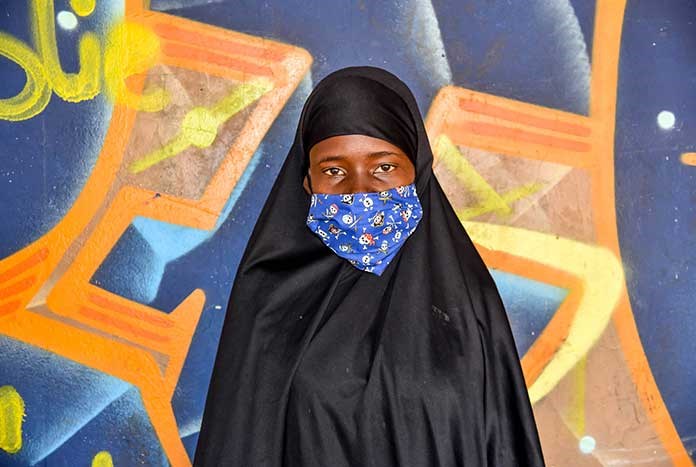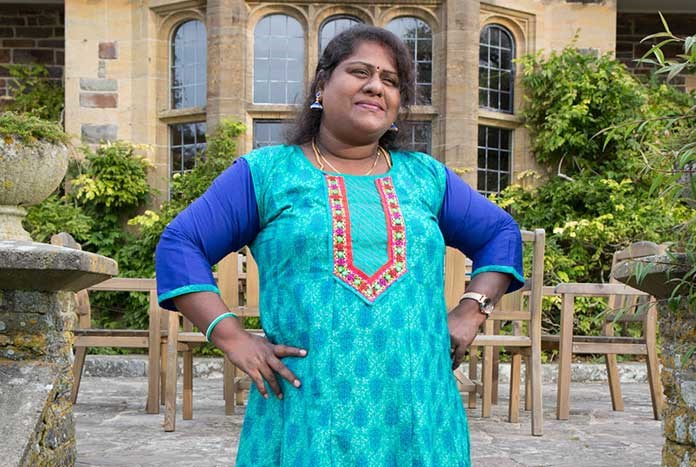Subscribe to ‘Words Of Hope’
Get our emails direct to your Inbox with updates about all our campaigns, trips and events.
Welcome to First Of The Month — a new big read from Amos Trust. Digital-only, long-form essays from Amos staff, friends and creative collaborators. For our second edition, Amos’ On Her Terms Lead Karin Joseph writes about why choice is a luxury.

Choice Is A Luxury
“Choose to Challenge.”
“A challenged world is an alert world. Individually, we’re all responsible for our own thoughts and actions — all day, every day. We can all choose to challenge and call out gender bias and inequality. We can all choose to seek out and celebrate women's achievements. Collectively, we can all help create an inclusive world. From challenge comes change, so let’s all choose to challenge.” International Women’s Day 2021
This is the theme for International Women’s Day this year, and I want to explore why it doesn’t go nearly far enough.
I lead Amos’ On Her Terms campaign which focuses on the lives of girls and young women surviving on the streets in cities around the world. What this theme evoked in me was a question. How does its call to ‘choose to challenge’ include the realities of their lives? How might framing ‘challenging gender inequality’ as a ‘choice’, not ring true with so many of the girls and young women who are most affected by these issues?
I’ll focus on three ways in which I think this year’s theme doesn’t come close to touching these realities:
1. When a choice isn’t really a choice at all
2. Recognising that ‘choosing to challenge’ inequality is a privilege
3. When individual action is not safe, or enough
And I’ll finish by talking about the heady aspiration of On Her Terms.
When a choice isn’t really a choice at all
How women resist
For women human rights defenders, challenging gender inequality isn’t a choice, it’s their intuitive and uninvited response to the deeply unequal societies in which they find themselves. It’s not hashtag friendly and is an everyday reality, not reserved for one day of the year. The stance these women take often leads to them losing their lives.
A few weeks ago, news agencies covered the ongoing investigation into the death of Karima Baloch. Karima was a women's rights activist from Pakistan living in exile in Canada, whose body was discovered in unexplained circumstances. She had campaigned tirelessly for women’s rights and freedoms in her home region of Balochistan in Pakistan, and had faced endless threats on her life forcing her into exile. At her funeral in her home state, a young female student was quoted:
“Because of her we can leave our houses in a tribal and conservative society. We can protest in a male-dominated society. She was one of the first to challenge the brutal state, outdated norms and tribalism. Her legacy lives on in us.”
It's not only women raising their voices for women's freedoms that face threats on their lives because of their gender. Berta Caceres, an environmental activist and indigenous leader, was murdered in her home in Honduras in 2016 because of her vocal opposition to the construction of a dam which would have devastated her community.
Malala Yousafszai, shot by the Taliban for speaking out for girls’ rights to an education, said recently on Desert Island Discs that she had become an activist in Pakistan because:
“For me the fear was living in that situation forever, for my whole life.”
This urgency, as expressed by Malala, shows how challenging gender inequality can never be a choice for these women.
When a choice isn’t really a choice at all
Choices made to survive
When we launched our On Her Terms campaign in early 2018, the Amos team had been on a long journey already, learning about the challenges facing our partners in their work with girls and young women on the streets.
This work was happening as part of broader programmes of outreach and support to both girls and boys — but there came a point where we realised, together with our partners, that we wanted to focus specifically on how to challenge the situations in these young women’s lives.
Working with girls and young women on the streets continues to be a difficult and often traumatic process with so many steps backward as well as small steps forward. We regularly saw the exhaustion and hopelessness felt by our partners’ frontline staff who couldn’t face another girl dead, beaten or traumatised on the streets or at home. It's why we couldn’t choose to look away — and we are so glad we didn’t.
A few years ago, an Umthombo staff member shared something with me that I’ve never forgotten. A girl had confided to a team member why she’d come to live on the streets of Durban. This is what she said:
“It’s better to be abused by someone you don’t know, rather than someone you do”.
This has sat with me for years. It says so much. It speaks of a young woman knowing, with a grim resignation, what lies ahead. And although she’s making a ‘choice’ of sorts, what kind of choice is that really?
In India, our partners Karunalaya deal with these complicated ‘choices’ regularly too. A family living in a pavement-dwelling community, whose relatives have lived on the same pavement for six generations, is faced with the option for their daughter of getting married at 14. This marriage will almost certainly involve a considerably older man. Yes, she will get to live in a home and break the generational cycle of street-dwelling, but at what cost? The reality is, within a year she will probably be a mother and will certainly not return to school again.
What is the alternative?
The alternative is often to stay living on the street for another generation, with all the risks to a woman that that entails. It can be hard to argue against the choice of child marriage when the alternative is so bleak. It’s important to stress that whilst forced marriage is also a grim reality for many girls, it is also very common for girls themselves to be fully involved in this ‘choice’ to marry early; it can look like the best option ahead of them, from their own perspectives as well as their families.
As much as Karunalaya continuously and passionately educates girls and their families on children’s rights, and on the importance of a girl’s education for her future, the stark reality means girls and their families often don’t feel they have that choice.
Recognising that ‘choosing to challenge’ inequality is a privilege
By framing ‘challenging gender inequality’ as a choice, we erase so many women and girls’ experiences, and the reality of their lives. It places the blame on them for the lives they live, and this is what disturbs me most about the phrase ‘choose to challenge’. What’s being implied is, you have a choice to challenge the violence and abuse you experience — and if you don’t challenge it, that’s on you.
Many women and girls carry huge burdens of discrimination, each adding an extra layer of weight, and each removing a set of choices from their grasp. It may be how they are treated because of their poverty, race, education, class, disability, sexuality, or religion. A white university-educated woman living in the UK, with some financial security to fall back on, may choose to challenge gender discrimination in her workplace. But what about a poor, Dalit woman who is living on the streets of Chennai, surviving and supporting her family on a tiny, fragile daily wage? Does she have any real option to challenge the discrimination, and often violence, she experiences because of her gender?
For so many girls and women around the world, having any choices in life is something they only dare to dream of. In this pandemic, we’ve all experienced our worlds getting smaller, the choices available to us becoming more and more limited. It doesn’t take much to imagine how for women and girls on the margins, living in worlds already so constricted, the idea of choice becomes a luxury beyond reach.
By framing ‘challenging gender inequality’ as a choice, we erase so many women and girls’ experiences, and the reality of their lives. It places the blame on them for the lives they live, and this is what disturbs me most about the phrase ‘choose to challenge’.
For a girl who is controlled by a pimp on the street — what does it mean in practice for her to begin to reassert control over her life? Standing up to someone who is without doubt your abuser, but who all the while offers you your protection and your livelihood is never a simple black-and-white situation. Or for that 14-year old girl, whose mother was married at her age — and who is being offered as a bride to someone who owns a house and can give her so-called security — how would she ‘choose to challenge’ the decisions often being made about her, without her?

Pandemic: A young woman supported by Umthombo in Durban, South Africa, through the coronavirus lockdowns in 2020
— — — — — — — —
Both of these girls do make choices in their lives each day. They still have the ability to make choices, but the choices available to them are often between two different levels of abuse; two bad options, one slightly better than the other. They are a world away from claiming their rights, or 'choosing to challenge'.
Despite the gender inequality that exists in every country on earth, we need to acknowledge the privilege of choice many women in the Global North have — a privilege not afforded to the global majority of women and girls.
When individual action is not safe, or enough
Niruthuda
Alone, the prospect of challenging this situation can seem an impossible task to a girl or young woman. But there is power in numbers: coming together to make change possible.
In Chennai, Karunalaya has recently established a legal and domestic violence centre for women in the fishing and pavement-dwelling communities. The pressures on family life in these communities have always been particularly hard: space is minimal with little privacy, the safety of children (particularly girls) is an issue, threats from police and huge job insecurity all contribute to women in these communities experiencing high incidences of domestic violence. Such incidences have soared since the start of the coronavirus pandemic and led to Karunalaya’s response.
Many organisations talk of ‘empowering women’ as though it is an action that can easily be ‘done’ by one person to another. The problem with this approach, is that if someone else gives you power, they can always take it away again. What Karunalaya is doing here is different: the women are building their own power, something nobody can take away from them. They are liberated to change their own circumstances, together.
Bhuvana, a long-standing community development worker at Karunalaya, is heading up this initiative. She and the team are forming women's associations, with self-elected leaders — they have already engaged four hundred women in four communities. Part of the strategy is legal education, so that women know their rights and can campaign for change, particularly to end the ‘hidden pandemic’ of domestic violence. Women have already delivered manifestos to the city’s police chiefs and are visiting local police stations too with their message, challenging them on why they don’t do more to tackle domestic violence.

Bhuvana from Karunalaya in Chennai, India at 2018’s On Her Terms summit in Devon.
— — — — — — — —
The slogan the women have chosen for their movement is “Niruthuda”, a forceful, unflinching word in Tamil meaning “Stop It”. This phrase is having a real impact when they introduce their manifestos, especially to police. Karunalaya’s next priority is to help these women’s groups get registered, which would mean they can take cases to court on behalf of women in the community. After a year of exhausting relief work, this is returning to the roots of Karunalaya’s community organising, collective action and human rights advocacy.
Alone, the prospect of challenging this situation can seem an impossible task to a girl or young woman. But there is power in numbers: coming together to make change possible.
The power of “Niruthuda” is its collective voice. This is real empowerment, with its feet firmly on the dusty pavements of Chennai. Women in pavement-dwelling communities know that alone, one female voice asserting “Niruthuda” would be ignored, laughed out of the room, or worse. But together, they cannot be ignored, and together they can choose to challenge the injustices they face. Just last week, at their monthly leaders’ meeting, one leader reflected,
“I now understand the power of women when they are united for a cause”.
The heady aspiration of On Her Terms
At Amos we often return to Arundhati Roy’s beautiful quote, “Another world is not only possible, she is on her way / On a quiet day I can hear her breathing.” We use it every week. Nine times out of ten it passes over me without a second thought. But the other day, it cut through again and made me stop and think. ‘Who is this other world, that is on her way?’
This is all still so far from true right now, it almost feels ludicrous to think about. Particularly when speaking to workers who are daily supporting girls on the streets to deal with trauma, to be able to trust again and to imagine alternatives for a better future despite all the obstacles and steps backwards — yet recognise the options they have to offer girls are so minimal. There are so many others who control the lives of girls around the world: family members, boyfriends, employers, and the oppressive weight of society’s expectations and norms.
But in the movement-building work in Chennai, forming relationships of trust in Durban, self-defence and women’s associations groups in Mwanza, and New Generation building a cohort of young business-women in Burundi — this new world may come into view, for this is how gender inequality is truly challenged with those who experience the full weight of its oppression.
The radical work being done in these girls’ and women’s lives every day may seem like small steps on an endless road stretching ahead. But through this work, women and girls first realise their own worth and value, recognise that how they are treated by men or by society at large is unacceptable. They are slowly, surely, equipped with what they need to start to take control of their own lives and be free. And the joy and hope in these small steps, is why we are so glad to be on this hard but beautiful journey.
‘On Her Terms’ is hugely aspirational — because it has to be. It’s got a vision of this ‘other world’ in its sights. It’s a girl whose life is fully in her own hands. Her future is something she can shape, control, and be hopeful about. A girl with an array of choices, good choices, ahead of her.
Karin Joseph
On Her Terms, Lead — Amos Trust
Karin joined Amos in 2018, and leads our On Her Terms campaign. She’s worked on child and youth homelessness for 10 years, in the UK and internationally. She heads up Amos’ work with our partners in Burundi, Tanzania, South Africa and India, and has been running the Amos@6 webinars behind the scenes during the recent lockdowns.
— — — — — — — —
More First Of The Month
Other editions of our First Of The Month essays are available to read and download from here.
Words of Hope E-news
Sign up to receive our regular ‘Words of Hope’ emails and keep up to date with all the latest Amos news and information, including details of our trips and events, news from our partners around the world, and all of our campaigns.
Online reflection
Join us for ‘Words of Hope’ online every Tuesday at 5pm — simply click here to join us a few minutes beforehand.
Amos Trust
7 Bell Yard, London
WC2A 2JR
UK
Telephone:
+44 (0) 203 725 3493
Email:
[email protected]
Registered Charity No.
1164234

This item has been added to your shopping basket. Please click on the Checkout button below where you can choose your quantity.
Continue shopping Checkout Close